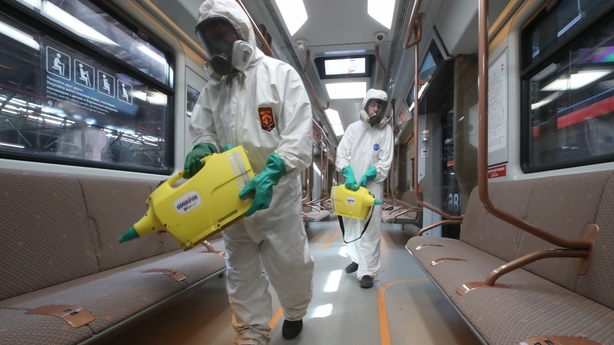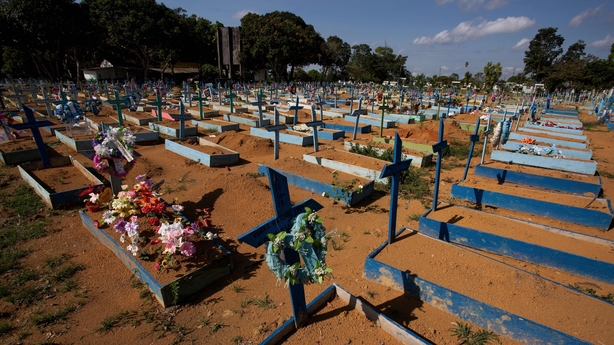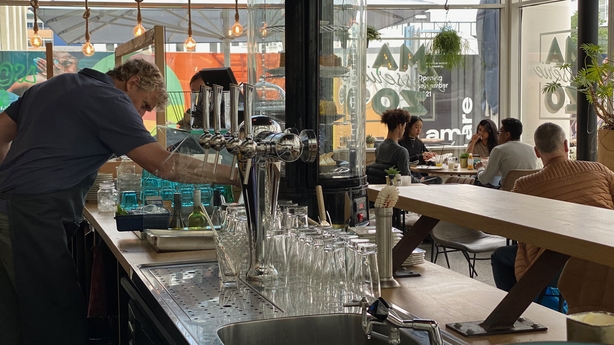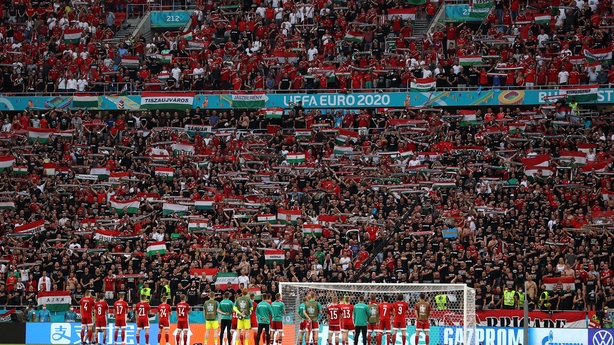Russia's capital Moscow has reported a pandemic high for new coronavirus cases for the second consecutive day, as the city's hospitals are flooded with new patients due to the Delta variant.
The city registered 9,120 new coronavirus infections in 24 hours, according to government figures, a second consecutive high topping the previous day's total of 9,056 cases.
Those figures have ballooned from just 3,000 daily just two weeks ago, with Moscow Mayor Sergei Sobyanin saying yesterday that the highly infectious Delta variant first identified in India represents nearly 90% of new cases.
The new wave of infections come as Russia's second city of Saint Petersburg, the country's worst Covid hotspot after Moscow, is slated to host seven Euro 2020 matches - including a quarter-final on 2 July - expected to draw thousands of European football fans.

Having claimed the worst of the pandemic had passed over winter, officials are now scurrying to reintroduce pandemic restrictions and roll out new beds dedicated to coronavirus patients after months of near-normal life.
On Monday, Saint Petersburg announced a tightening of restrictions including no food sales in its Euro 2020 fan zones.
Measures have been more drastic in Moscow, where Mr Sobyanin yesterday shuttered the city's fan zone, banned gatherings of more than 1,000, suspended all mass entertainment events and closed dance halls.
He also extended several measures that he had announced last weekend, like the closure of food halls in malls, zoos and playgrounds, and of bars and restaurants from 11pm to 6am.
Mr Sobyanin, who has taken a leading role in Russia's response to the pandemic, has said the measures are necessary because the capital's hospitals were inundated with Covid patients within days.
On Thursday, he said that in just five days 13,000 free hospital beds had been "eaten up" and that the city has since expanded to 17,000 beds.
While Russia imposed a national lockdown when Covid first began spreading last spring, authorities have not reintroduced the measure since lifting it last summer in the hopes of buttressing a struggling economy.
They have instead banked on the country's four vaccines - Sputnik V, EpiVacCorona, CoviVac and the one-dose Sputnik Light - to curtail the pandemic.
Russia is among the countries hardest hit by the pandemic, with the sixth-highest number of cases in the world, according to an AFP tally based on official figures.
On Thursday, it overtook Britain as the European country to suffer the most Covid deaths, which today stood at 128,911.
But Kremlin critics have accused authorities of downplaying the severity of the pandemic by only counting fatalities where Covid was found to be the primary cause of death after autopsy.
Figures released by federal statistics agency Rosstat show that Russia had recorded at least 270,000 virus-related deaths by the end of April.
Brazil crosses threshold of 500,000 virus-related deaths
Brazil has crossed the grim threshold of 500,000 coronavirus deaths, the country's health minister said, trailing only the United States in lives lost to Covid-19.
"500,000 lives lost due to the pandemic that affects our Brazil and the world," Marcelo Queiroga tweeted, without giving the death toll from the past 24 hours.
As of Friday, the Health Ministry had recorded 498,499 deaths, with a daily average of more than 2,000 in the last seven days.
According to a consortium of the country's main media groups, the overall death toll rose to 500,022.
Brazil, with a population of 212 million, became the second country after the United States to surpass 500,000 Covid-19 deaths.

The South American country experienced a second wave of the pandemic this year, when it topped 4,000 deaths per day.
Brazil now appears to be grappling with a third wave in its outbreak, with infections and deaths spiking.
According to the latest weekly report from the Fiocruz medical research foundation, the country is in a "critical" situation with a high number of deaths and the possibility of things worsening in coming weeks as winter arrives in the southern hemisphere.
Experts are concerned about the slow rollout of the country's vaccination campaign, the spread of more aggressive virus variants and President Jair Bolsonaro's hostility toward preventative measures like mask wearing and lockdown restrictions.
Mr Queiroga tweeted that he was working "tirelessly to vaccinate all Brazilians in the shortest possible time and change this scenario that has plagued us for more than a year."
Dutch take 'big step' towards ending coronavirus curbs
The Netherlands has announced further easing of a raft of measures to combat coronavirus, including an end to mask-wearing in most places.
Prime Minister Mark Rutte said the country was "taking a big step" towards a life without restrictions, from 26 June.
"Almost everything is possible at a distance of 1.5 metres," he added.
The government would decide in mid-August if protective measures such as social distancing could be dropped.
"We are heading for a beautiful summer," Mr Rutte predicted.
Masks will no longer be compulsory so long as social distancing can be applied, which the government says is not possible on public transport and in secondary schools.

Nightclubs can reopen to clients who show negative tests.
A partial lockdown ended on 5 June when restaurants were allowed to serve customers indoors again.
And from next Friday, the hospitality industry will be able to put up big screens to show Euro 2020 football matches indoors or out, provided clients keep at least 1.5 metres apart.
"I hope the Netherlands will make the final," Mr Rutte said.
The nation of 17 million has recorded more than 1.5 million coronavirus cases and in excess of 17,700 deaths during the pandemic.
Merkel, Macron urge vigilance over virus risk at Euro 2020
German Chancellor Angela Merkel and French President Emmanuel Macron urged caution in allowing fans to crowd Euro 2020 stadiums while the coronavirus pandemic still posts major risks.
"We can't act as if corona were over" despite dropping infection rates in much of Europe, Ms Merkel told reporters when asked about plans for the upcoming matches.
"You can see based on the example of Lisbon how quickly things can change," referring to a recent resurgence of Covid-19 cases in the Portuguese capital.
She noted that fully vaccinated people were still in the minority in most European countries "which is why caution is still necessary".
Ms Merkel said that applied in particular to "big events".
"In Munich for example you had 14,000 fans [for the Germany-France match on Tuesday]" under strict hygiene rules, she said.
"But when I see fully packed stadiums in other European countries, I am a little sceptical whether that is the right thing in the current situation."
Hungarian and Portuguese fans returned to a packed football stadium on Tuesday, the Puskas Arena in Budapest - the only Euro 2020 tournament venue not to limit fan capacity as a Covid-19 health precaution.

Mr Macron - the Chancellor's first foreign guest at her chancellery since pandemic shutdown measures were imposed - said he was confident that organisers of the tournament were "very vigilant".
British Prime Minister Boris Johnson has said his priority was keeping the "country safe from Covid", as a source confirmed to AFP that UEFA was keeping the option open of moving the Euro 2020 semi-finals and final from Wembley to Budapest.
The French president said in light of the reports that "we'll have to keep an eye on things" for the teams and fans, particularly in view of the rapid spread of the highly contagious Delta variant of the coronavirus in Britain.
Cambodia reports 20 Covid deaths, first cases of Delta variant
Cambodia has reported 20 deaths from Covid-19, a record for a single day, as the country also detected its first Delta variant cases and authorities urged people to be vigilant.
The Southeast Asian nation has recorded one of the world's smallest Covid-19 caseloads, but the outbreak that was first detected in late February has caused infections to climb to 42,052 cases with 414 deaths.
"Please continue to be vigilant by practising hygiene, social distancing and not leaving your homes unnecessarily. Our country and the world continue to be plagued by the Covid-19 pandemic," Cambodia's Communicable Disease Control Department said in a statement posted on Facebook.
The Ministry of Health also reported seven cases of the Delta variant of the coronavirus among travellers by land from neighbouring Thailand.
"Every one must continue to be vigilant," said a health ministry spokeswoman.
South China airport cancels flights after Delta variant case detected
The airport in China's southern city of Shenzhen cancelled hundreds of flights and tightened entry controls after a restaurant employee tested positive for the Delta coronavirus variant.
City health officials said a 21-year-old waitress at Shenzhen Baoan International Airport tested positive during a routine test for airport staff conducted on Thursday.
Shenzhen, a mainland Chinese city neighbouring Hong Kong, is home to some of Asia's biggest tech companies including telecoms equipment maker Huawei and gaming giant Tencent.
China reported 30 new coronavirus cases yesterday, including six local transmissions in the southern province of Guangdong where Shenzhen is located.
Millions of Shenzhen residents have been tested for the virus in recent weeks after a small outbreak at the city's port earlier this month.

